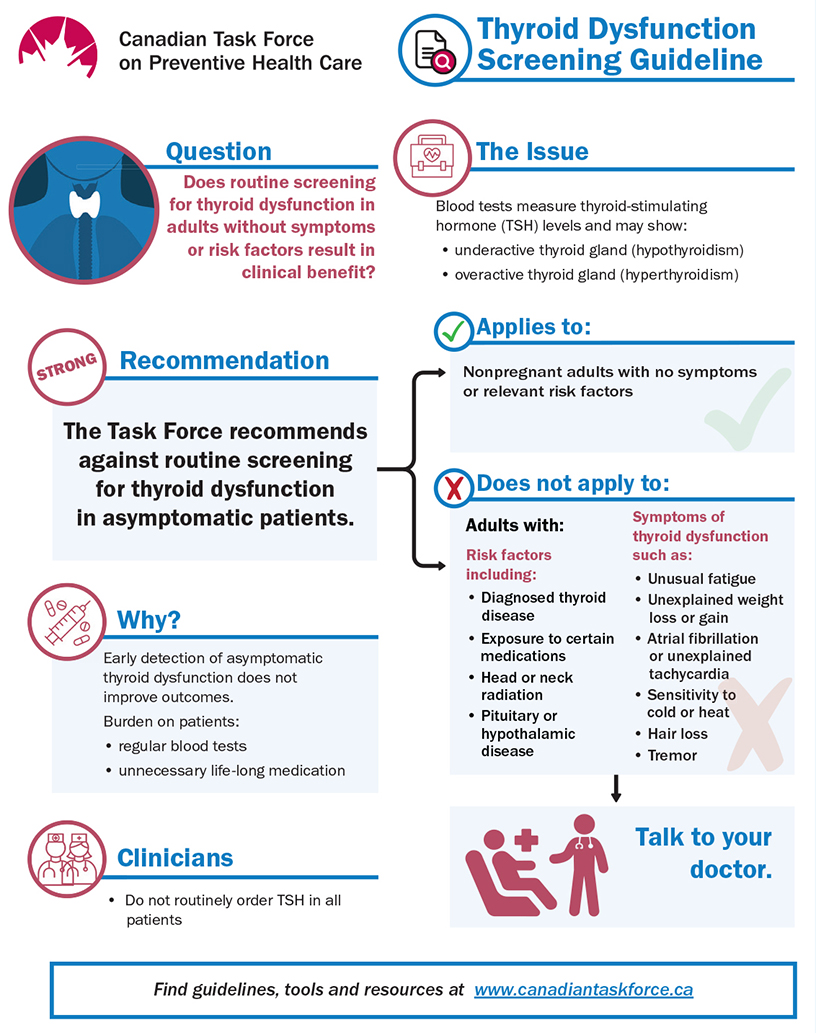Screening for thyroid dysfunction in patients without symptoms: Don’t check that box routinely
A new guideline from the Canadian Task Force on Preventive Health Care found no benefit to routine screening for thyroid dysfunction in adults without symptoms or risk factors. Based on the latest evidence, the Task Force guideline recommends against routine screening for thyroid dysfunction in nonpregnant adults; the guideline is published in the CMAJ (www.cmaj.ca/content/191/46/E1274).
Routine screening for thyroid dysfunction in people without symptoms or risk factors is commonly ordered, but practice varies by primary care practitioner. According to the recommendation, the evidence isn’t there to suggest a health benefit for this type of screening as a routine part of care. This recommendation does not apply to patients with symptoms, including unexplained fatigue or weight change, sensitivity to heat or cold, hair loss, and irregular heart rhythms. People on medications such as lithium or amiodarone or with risk factors for thyroid dysfunction, such as previous thyroid disease or surgery, radiation to head or neck or pituitary or hypothalamic diseases, are also exempt from this guideline.
The Task Force conducted a rigorous systematic review of the latest evidence. Although no screening trials were identified, 22 studies on the effectiveness of treatment for abnormal thyroid-stimulating hormone (TSH) findings in asymptomatic adults were included. The Task Force did not find evidence of benefits from screening and treatment in people without symptoms, but highlighted that screening requires patients to undergo testing.
Given the lack of benefit to patients, as well as the need to take medication unnecessarily and have regular medical visits and follow-up blood tests to check TSH levels, the Task Force strongly recommends against routine TSH screening in asymptomatic adults.
Clinicians should be aware of symptoms, signs, and conditions associated with thyroid dysfunction so that patients with these can be tested, particularly symptomatic postmenopausal women, given the higher prevalence of hypothyroidism in that population.
Alignment with other guidelines
The British Columbia Ministry of Health and Toward Optimized Practice from Alberta recommend against testing for TSH in asymptomatic patients. The College of Family Physicians of Canada, the Nurse Practitioner Association of Canada, and the Canadian Society of Endocrinology and Metabolism have endorsed the guideline.
For an additional overview and tools, visit https://canadiantaskforce.ca/guidelines/published-guidelines/asymptomatic-thyroid-dysfunction. To listen to a related podcast about the guideline, visit https://soundcloud.com/cmajpodcasts/190395-guide. To read the systematic review published in the journal Systematic Reviews visit https://link.springer.com/article/10.1186/s13643-019-1181-7.
The Canadian Task Force on Preventive Health Care is an independent panel of health professionals who are experts in clinical preventive health care and guideline methodology. The Task Force’s mandate is to develop and disseminate evidence-based clinical practice guidelines for primary and preventive care.


